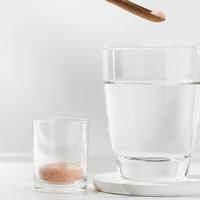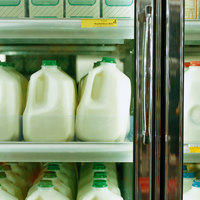UNICEF Report: Global Obesity Among Children Has Surpassed Those Underweight
Image Source: Abdulai Sayni / Unsplash
According to recent UNICEF data, underweight children aged 5-19 have declined overall since 2000, from nearly 13% to 9.2%, while childhood obesity rates have risen from 3% to 9.4%. Collected from over 190 countries, the data indicates that obesity has officially surpassed underweight in children globally. The UNICEF report warns that without preventions against childhood obesity, countries could face lifetime lasting impacts on economies and overall health. “Obesity is a growing concern that can impact the health and development of children. Ultra-processed food is increasingly replacing fruits, vegetables and protein at a time when nutrition plays a critical role in children’s growth, cognitive development and mental health,” said UNICEF Executive Director Catherine Russell.

Dietitians Disprove Pink Salt Weight-Loss Hack
Image Source: Stock / Today
Registered Dietitian Natalie Rizzo is debunking the "Pink Salt Trick". The latest viral food hack on social media mixes Himalayan pink salt and lemon juice in water. Influencers tout the benefits of balanced electrolytes and enhanced hydration, along with the promise of weight loss. Alas, notes Rizzo, drinking lemony mineral water does not cause excess pounds to magically melt away. The added sodium is also a potential health risk, as nearly 90% of Americans already exceed their recommended daily sodium intake, according to the American Heart Association.

How Matcha Blocks Iron Absorption
Image Source: Anna Efetova / Getty Images
Matcha's antioxidant properties make the green tea a healthy beverage, but its tannins contain a polyphenol that binds to iron in digestion, preventing iron absorption. Studies suggest one serving of green tea can hinder iron absorption up to 60-90%, which could lead to iron deficiencies in some individuals. Drinks like red wine and black tea have similar effects, but matcha's high concentration makes the beverage particularly polyphenol heavy. “This mostly affects non-heme iron (from plants), not heme iron (from meat), which is absorbed more easily and isn’t as affected by polyphenols,“ says Debbie Petitpain, MBA, RD, spokesperson for the Academy of Nutrition and Dietetics.

More Health News
Study Reveals Food Assistance Programs Are Associated With Slower Cognitive Decline In Adults
Food Safety Experts Say Recent FDA Cuts Threaten Food Supply Safety Long Term
Image Source: Chad Baker - Jason Reed - Ryan McVay / Getty Images
Mass federal layoffs among the departments overseeing food in the U.S. like the FDA, USDA, and CDC have experts worried about food safety going forward. Nearly 80 percent of the U.S. food supply is regulated by the FDA, and in March, the U.S. Department of Health and Human Services revealed the FDA would cut 3,500 FDA employees. “I’m not worried about the food I’m buying tomorrow or in a week or in two weeks, I’m worried about long-term,” says Martin Wiedmann, a food safety scientist at Cornell University. Former FDA commissioner Robert Califf points out that "the food side of the FDA has been massively underfunded," and in 2024, 17% of the FDA’s nearly $7 billion budget went to food regulations, about half of what the agency spent on overseeing drugs.

Recent Study Shows Why Bananas May Dilute Health Benefits In Smoothies
Image Source / Markus Spiske
A new study published in the Food & Function Journal from Royal Society of Chemistry suggests bananas may be hindering the nutritional value of other ingredients in digestion. Bananas contain the enzyme polyphenol oxidase, which reduces the absorption of flavan-3-ols in fruits. This subgroup of flavonoids are found in most fruits and they carry immense nutritional value. The study found that when bananas are blended with other fruits in smoothies, polyphenol oxidase reduced the amount of flavonoids present in the blood stream. The consumption of bananas directly after eating other fruits also hindered the digestion of the flavan-3-ols in other fruits.

Study Shows Climate Change Will Increase Arsenic Levels In Rice
Image Source: Alamy / BBC
For about half as long as we've been eating rice, we have been aware of the presence of arsenic in the grain. Arsenic is a naturally occurring chemical that attaches to rice granules in the soil, and researchers in China tested its presence based on environment to see if arsenic levels varied by climate. This study was conducted by growing 28 different varieties of rice in 4 different locations. Researchers concluded that arsenic levels in the rice shot up as carbon dioxide levels in the atmosphere and temperatures rose. As climate change brings high CO2 levels and global warming, arsenic levels in rice are expected to rise. If you're worried, eat white rice. It has less inorganic arsenic than brown rice.
